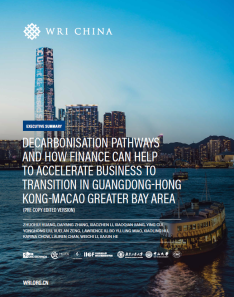DECARBONISATION PATHWAYS AND HOW FINANCE CAN ACCELERATE THE BUSINESS TRANSITION TO A LOW-CARBON ECONOMY IN THE GUANGDONG–HONG KONG–MACAO GREATER BAY AREA
This report aims to connect decarbonization solutions with the finance required to accelerate the net-zero transition in the GBA, to analyse macro pathways for the whole GBA and specific decarbonisation pathways for the key energy-consuming sectors. This report estimates how much investment will be required and how finance can accelerate the business transition to a low-carbon economy as well. We really appreciate the funding from Standard Chartered Bank made this research possible.
The Intergovernmental Panel on Climate Change (IPCC) released its synthesis report in 2023, warning that “rapid and deep” systemic changes are needed to limit global warming to the Paris Agreement’s 1.5-degree Celsius goal, and GHG emissions need to peak at the latest before 2025 and then reach net zero CO2 emissions in the early 2050s (IPCC 2023). As the world’s largest CO2 emitters since 2005 (Climate Watch 2022) contributing 28% of the world’s CO2 emissions, China is critical to carbon emissions reduction.
The GBA is expected to lead by example in advancing its carbon emission peaking and carbon neutrality earlier than the national “30-60” goals –China’s national goal of carbon emissions peaking by 2030 and carbon neutrality by 2060, as well as create a regional benchmark for green and lowcarbon development.
This report aims to connect decarbonization solutions with necessary finance required to accelerate the net-zero transition in the GBA. It firstly applied a top-down approach to predict macro pathways for the whole GBA, then applied bottom-up approach to analyse specific decarbonization pathways and solutions for key energy consuming sectors--manufacturing industries, road transport, and buildings, to highlight actions most needed to achieve the 30-60 goal, and more ambitious goals to peak emissions and achieve carbon neutrality earlier. Based on the above decarbonization pathways, this report estimated how much investment will be needed and how to solve the challenges faced to ensure finance to help accelerate businesses to transition.
Our analysis shows that ambitious actions are needed for GBA’s earlier carbon emission peaking and carbon neutrality.
- Current Policy Scenario: the rate of each city’s carbon intensity reduction for every five-year period in the future retains what was in the 13th FYP, result shows that the GBA will reach its peak emissions in2030, and a remaining 355 million tonnes of CO2 emissions will need to be offset in 2060.
- 30-60 Scenario: To be consistent with the national 30-60 goals, carbon emissions in the GBA need to peak by 2030, carbon intensity reduction same with the Current Policy Scenario can enable this. If carbon neutrality means 90% emission reduction and 10% offset by forest sink and negative emissions technologies an emission cap goal will be needed since 2030 and annual emission reduction during 2030-2060 need be around 7.5%.
- 25-50 Scenario: If carbon intensity can be reduced by 24% in the 14th FYP, the GBA can peak its emissions by 2025. Peak emission value will be 467 million tonnes of CO2. Annual emission reduction rate during 2025-2050 should be around 16% if we want to achieve carbon neutrality around 2050.
The GBA’s energy-related carbon emissions come mainly from three key sectors: manufacturing industry, building operations and road transport accounted for 32%, 31% and 20% of the emissions respectively in 2020.This study sets up Baseline Scenario, Enhanced Policy Scenario and Zero-Emission Scenario, to provide in-depth analysis for the three sectors.
Our analysis shows:
- Manufacturing industry in the GBA is estimated to peak carbon emissions during the 15th FYP (2025-2030) and is expected to achieve carbon neutrality around 2055-2060.The most important contribution to carbon neutrality comes from decarbonized power generation and heating systems. Phasing down fossil fuels use is the second large contributor to emission reduction, it can be achieved by substituting low-and no-carbon fuel and feedstocks to reduce emissions for industrial processes.
- Stricter policies could allow the GBA’s road transport sector to achieve peak emissions by 2026 or even earlier. Carbon emissions from road transport in the GBA was 91.5 million tonnes in 2020. Gasoline and diesel will still be the main energy sources for a long time, but electricity and hydrogen will eventually become the main energy supply. Among all policies and measures, promotion of NEVs together with upstream clean electricity and green hydrogen will contribute to the largest emission reduction potential in the long-term. In the mid-term, mode shift will be the largest contributor.
- Building sector in the GBA is projected to peak its carbon emissions in 2025 at the earliest and achieve carbon neutrality by 2058. Both the stock and future increment of building emissions are mainly in public and commercial buildings. Energy efficiency is important to decarbonize building sector in the near future while decarbonized electricity contributes the largest potential in emission reduction.
Funding needs to support the transition and key challenges on existing financial practices to accelerate the transition
Our analysis estimated that the GBA needs appr. US$1.84 trillion to achieve carbon neutrality by 2060, which equals to about 1% of cumulative GDP from now to 2060. Of the estimated US$1.84 trillion financing required for GBA’s decarbonization by 2060, 55% would be needed in the energy intensive industries, such as petrochemical, road transport and buildings.
This study summarizes five challenges of unlocking finance to accelerate businesses to decarbonization given GBA’s unique role in the “dual markets”: More cross-regional policy coordination needed, insufficient scientific guidance for transition plans, limited financial tools to accelerate transition, unaligned carbon market mechanisms.
Six recommendations for finance to accelerate GBA’s decarbonization
We propose the implementation of the following key measures:
- Establish a cross-regional agency coordination mechanism for financing decarbonization in the GBA.
- Facilitate interoperability of Common Ground Taxonomy/transition finance taxonomies and information disclosure among Mainland China, international and/or Hong Kong standards.
- Encourage GBA’s financial institutions and enterprises to set up net-zero targets.
- Develop a transition-related financial toolbox to scale up finance.
- Develop industries-specific financial solutions for the key sectors in the GBA.
- Facilitate the regional carbon market to accelerate GBA’s transition.

